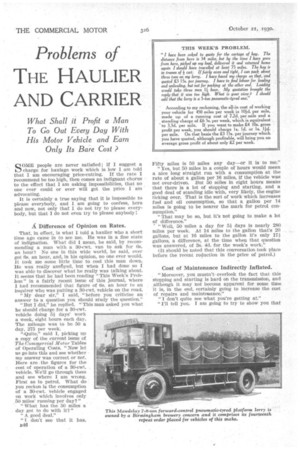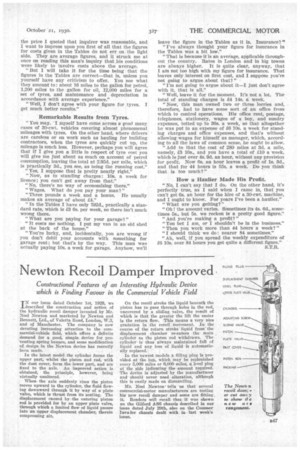Problems of
Page 72

Page 73

If you've noticed an error in this article please click here to report it so we can fix it.
THE HAULIER
AND CARRIER
What Shall if Profit a Man To Go Out Every Day With His Motor Vehicle and Earn Only Its Bare Cost ?
SOME people are never satisfied ; if I suggest a charge for haulage work which is low I am told that I am encouraging price-cutting. If the rate I recommend be too high, then comes an indignant chorus to the effect that I am asking impossibilities, that no one ever could or ever will get the price I amn advocating.
It is certainly a true saying that it is impossible to please everybody, and I am going to confess, here and now, not only that I do not try to please everybody, but that I do not even try to please anybody !
A Difference of Opinion on Rates.
That, in effect, is what I told a haulier who a short time ago came in to see me. He was in a fine state of indignation. What did I mean, he said, by recommending a man with a 30-cwt. van to ask for Os. an hour? No one in this wide world, he said, ever got 6s. an hour, and, in his opinion, no one ever would. It took me some little time to cool this man down. He was really allayed, but when I had done so I was able to discover what he really was talking about. It seems that he had been reading "This Week's Problem " in a fairly recent issue of this journal, where I had recommended that figure of 6s. an hour to an inquirer whq was putting a 30-cwt. vehicle on the road.
"My dear sir," I said, "before you criticize an answer to a question you should study the question."
".Quite," said I, picking up a copy of the current issue of The Commercial Motor Tables of Operating Costs. "Now let us go into this and see whether my answer was correct or not. Here are . the figures for the cost of operation of a 30-cwt. vehicle. We'll go through them and see where I am wrong. First as to petrol. What do you reckon is the consumption of a 30-cwt. Vehicle engaged on work which involves only 50 miles' running per day?"
"What has the 50 miles a day got to do with it?"
"A good deal."
"1 don't see that it has. B4f3
Fifty miles is 50 miles any day—or it is to me."
"Yes, but 50 miles in a couple of hours would mean a nice long straight run with a consumption at the rate of about a gallon per 16 miles, if the vehicle was not over-driven. But 50 miles in eight hours means that there is a lot of stopping and starting, and a good deal of standing idle with, very likely, the engine ticking over. That is the sort of work which increases fuel and oil consumption, so that a gallon per 14 miles is going to be nearer the mark for petrol consumption."
"That may be so, but it's not going to make a lot of difference."
"Well, 50 miles a day for 51 days is nearly 280 miles per week. At 14 miles to the gallon that's 20 gallons, but at 16 miles to the gallon it's only 171 gallons, a difference, at the time when that question was answered, of 3s. 4d. for the week's work."
(It should be noted that this conversation took place before the recent reduction in the price of petrol.)
Cost of Maintenance Indirectly Inflated.
"Moreover, you mustn'toverlook the fact that this stopping and starting is hard on the transmission, and _although it may not become apparent for some time it is, in the end, certainly going to increase the cost of repairs and maintenance."
"I don't quite see what you're getting at."
" tell you. I am going to try to show you that the price I quoted that inquirer was reasonable, and I want to impress upon you first of all that the figures for costs given in the Tables do not err on the light side. They are average figures, and it struck me at once on reading this man's inquiry that his conditions were likely to involve costs above the average. "But I will take it for the time being that the figures in the Tables are correct—that is, unless you yourself have any criticism to offer. You see what they amount to: about 16 miles to the gallon for petrol, 1,200 miles to the gallon for oil, 12,000 miles for a set of tyres, and maintenance and depreciation in accordance with average experience."
"Well, I don't agree with your figure for tyres. I get much better results."
Remarkable Results from Tyres.
"You may. 1 myself have come across a good many cases of 30-cwt. vehicles covering almost phenomenal mileages with tyres. On the other hand, where drivers are careless or on work such as hauling for building contractors, when the tyres are quickly cut up, the mileage is much less. However, perhaps you will agree that if I give you a little in respect of tyre cost you will give me just about as much on account of petrol consumption, leaving the total at 2.95d. per mile, which is practically 3d., you see, as being the rimning cost."
"Yes, I suppose that is pretty nearly right." "Now, as to standing charges : 10s. a week for licence; you can't get away from that" "No, there's no way of economizing there." "Wages. What do you pay your man?"
" Three pounds a week and a bonus. He usually makes an average of about £4."
"In the Tables I have only 792d., practically a standard rate, which is £3 Os. per week, so there isn't much wrong there.
"What are you paying for your garage?" " It costs me nothing. I put my van in an old shed at the back of the house."
"You're lucky, and, incidentally, you are wrong if you don't debit your accounts with something for garage rent; but that's by the way. This man was actually paying 10s. a week for garage. Anyhow, we'll leave the figure in the Tables as it is. Insurance?" "I've always thought your figure for insurance in the Tables was a bit low."
'That is because it is an average, applicable throughout the country. Rates in London and in big towns are always higher. It Is quite clear, anyway, that I ant not too high with my figure for insurance. That leaves only interest on first cost, and I EzUppOge you're not going to argue .about that?" • "I'm not going to argue about it—I just don't'agree with it, that is all."
"Well, leave it for the moment. It's not a lot. The total of standing charges is £4 14s. a week.
"Now, this man owned two or three lorries and, therefore, had to have sonic sort of an office from which to control operations. Bi office rent, postage, telephones, stationery, wages of a boy, and sundry expenses, totted up to 36s. a week, so that altogether he was put to an expense of £6 10s. a week for standing charges and office expenses, and that's without allowing wages for himself as manager, which, according to all the laws of common sense, he ought to allow.
"Add to that the cost of 280 miles at 3d. a mile, namely, £3 10s., and you have a total of £10 a week, which in over 4s. 9c1. an hour, without any provision for profit. Now 6s. an hour leaves a profit of 1s. 3d., and that for 44 hours is 55s. a week. Do you think that is too much?"
How a Haulier Made His Profit.
"No, I can't say that I do. On the other hand, it's perfectly • true, as I said when I came in, that you can't get 6s. an hour for the hire of a 30-cwt. machine, and I ought to know. For years I've been a haulier."
"What are you getting?" • "Oh the amount varies. Sometimes its 4s. 6d., sometimes 5s., but 58. we reckon is a pretty good figure." "And you're making a profit?"
"You bet I am, or I shouldn't be in the business." "Then you work more than 44 hours a week?" "I should think we do: nearer 84 sometimes." " Ah, well, if you spread the weekly expenditure of .£6 108. over 84 hours you get quite a different figure."
S.T.R.




















































































































